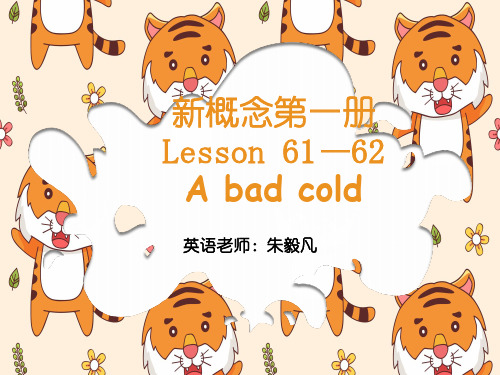六年级英语自学导读-Lessons 61-62_新概念英语第一册
- 格式:doc
- 大小:24.50 KB
- 文档页数:4


RevisionDictation:Lesson 59Can you fill in the blank?L: I want some _________, please. A: Do you want the ___________or the _____ size?L: The large ____ , please.A: Do you want any _____ _____?L: Yes, ___do.A: I don’t have any____ _____. I only have a large ____. Do you want a ____?L: Yes, please. And I want some ____.A: A _____ of _____.L: And I want a ____ box of ______, too.A:I only have ____ _____. Do you ____ ____?L: No, ____ ______.A:Is that____? L:_________,thank you.A:_________ do you want ? L:I want my______.envelopeslarge size smallsizewriting paperwesmall pads ones padgluebottle gluelarge chalkssmall boxes want onethank you.all That`s allWhat else changeHow to tell the time?如何表达时间?What's the time?It's about eight three.What time is it?It's nine five.Lesson 61 A bad coldQuestions What’s the matter with Jimmy?He has a bad cold.Does Jimmy like school?No, he doesn’t.What is good news for Jimmy?He must stay in bed for a week.Words &expressions f ee l[f i:l]v.感觉feel+adj.(形容词)l oo k[l u k]v. 看(起来)look +adj(形容词)看起来...look at + n./pron. 看...m u st[mʌst] modal verb(情态动词)必须must+动词原形;没有人称和数的变化否定:must +not +动词原形疑问:must 放句首;否定回答用:No,...needn't.c al l[kɔ:l] v. 叫、请固定搭配:call the doctor 请医生、call the police 报警call sb. at+电话号码给某人某号码打电话call sb. 给某人打电话Words &expressionsd o ct or[`dɒktə]n. 医生t e l e ph o ne[`t e l i fəu n] n.电话r e m e b er[r i`m e mbə]v.记得、记住remember to do sth. 记得去做某事remember doing sth. 记得做过某事remember sth. 记得某事m ou th[m auθ] n. 嘴t o ngue[tʌŋ] n. 舌头mother tongue 母语b a d [bæd]adj. 坏的、严重的be bad for 对...有坏处c o ld [kəu ld]n.感冒have a cold 得感冒n ew s [n ju:z]n.消息(不可数) a piece of news 一则消息Mr:Where is Jimmy?Mrs:He’s in bed .Mr:What’s the matter with him?Mrs:He feels ill .特殊疑问词-”在哪?“-问地点在床上=What`s wrong with him?feel-感官系动词+adj.-”表示自我感觉”feel感到look看起来sound听起来smell闻起来taste尝起来+表(形容词)(“怎么样”)1. 主语+系动词happykindgoodbaddeliciousMr:He looks ill.look-感官系动词+adj.-”表示外表形象”Mrs:We must call the doctor.must-情态动词+动词原形Mr:Yes, we must.can-情态动词+动词原形Mr:Can you rememberthe doctor’s telephone number ? Mrs:Yes.It’s 09754.Doctor:Open your mouth, Jimmy.Show me your tongue.say, ‘Ah’.动词原形引导的”祈使句“-省略了主语”you“Mr:What’s the matter with him, doctor? Doctor:He has a bad cold, Mr. Williams.得重感冒So he must stay in bed for a week.因此、所有-表结果for+时间段”计/达...“must+动词原形Mrs:That’s good news for Jimmy.Doctor:Good news?Why ?Mr:Because he doesn’t like school!对...来说不可数n.特殊疑问词-“为什么?”-问原因;用because 引导答句Lesson 62 What's the matter with them?他们怎么啦?What must they do?他们该怎么办?Words &expressions h ea d a che[`h e d ei k]n. 头痛e a r a che[`iər ei k] n.电话t oo th a che[`t u:θei k]n.牙痛st o m a ch a che[`stʌmək-ei k] n. 胃痛a spir i n[`æspr i n] n. 阿司匹林(可数) d e nt i st [`d e nt i st]n. 牙医m e d i c i ne [`m e d i s i n]n. 药(不可数)t e mp e r a t ure[`tempərəə]n.温度fl u[fl u:]n.流行性感冒(不可数)m ea sles[`m i:zəlz]n.麻疹(不可数)m u mps[mʌmps]n.腮腺炎(不可数)1.ache 后缀,加在某个身体部位后表示哪儿疼2. 感冒have a cold 重感冒have a bad colda cold 感冒flu 患流行性感冒a temperature 发烧a toothache 牙疼havea headache 头疼an earache 耳朵疼a stomach ache 胃疼measles 患麻疹mumps 患腮腺炎了3. take the medicine 吃药have an aspirin 吃阿司匹林(一种止痛药)What's the matter with you?I have a bad cold.What must you do?I must stay in bed.He cold.He .I have a bad cold.I must stay in bed.must 后跟动词原形.has a bad must stay in bedHe ______ (have/has)a headache.He must ________ (take/takes) an aspirin.I have a headache.I must take an aspirin.must 后跟动词原形.has takeShe ___________________.She ___________________ .I have an earache.I must see a doctor.仿写例句,注意第三人称单数形式.has an earache must see a doctorHe ___________________.So he ___________________ .I have a __________.So I must see a dentist.仿写例句,注意第三人称单数形式.toothache has a toothache must see a doctor____________________.____________________ .I have a ________ ache.So I must go to bed.填空并仿写例句,主语是he .stomach He He has a stomach ache must go to bedShe___________________.So she___________________ .I feel ill.So I can't go to school.填空并仿写例句,主语是she .feels ill.can't go to school.He ___________________.We___________________.I dont' like doctor.She doesn't like doctor.变仿例句.doesn't like doctor.don't like doctor.。

新概念英语第一册第61-62课:A bad coldLesson 61 A bad cold重感冒Listen to the tape then answer this question.What is good news for Jimmy?听录音,然后回答问题。
吉米有什么好消息?MR WILLIANMS: Where's Jimmy?威廉斯先生:吉米在哪儿?MRS WILLIAMS: He's in bed.威廉斯夫人:他躺在床上。
MR WILLIAMS: What's the matter with him?威廉斯先生:他怎么啦?MRS WILLIAMS: He feels ill.威廉斯夫人:他觉得不舒服。
MR WILLIAMS: He looks ill.威廉斯先生:他看上去是病了。
MRS WILLIAMS: We must call the doctor.威廉斯夫人:我们得去请医生。
MR WILLIAMS: Yes, we must.威廉斯先生:是的,一定得请。
MR WILLIAMS: Can you remember the doctor's telephone number?威廉斯先生:你还得医生的电话号码吗?MRS WILLIAMS: Yes. It's 09754.威廉斯夫人:记得。
是09754。
DOCTOR: Open your mouth, Jimmy. Show me your tongue. Say, 'Ah'.医生:把嘴张开,吉米。
让我们看看你的舌头。
说“啊——”MR WILLIMAMS: What's the matter with him, doctor?威廉斯先生:他得了什么病,医生?DOCTOR: He has a bad cold, Mr Williams, so he must stay in bed for a week.医生:他得了重感冒,威廉斯先生,因此他必须卧床一周。



六年级英语自学导读-Lessons61-62_新概念英语第一册课文详注Further notes on the text1.fell ill, 感受病了;look ill, 看起来有病。
前者指自我感受,后者指外表形象。
ill是表语,look和feel差不多上系动词,可像am/is/are那样,后面跟形容词。
2.…so he must stay in bed for a week.……因此他必须卧床休息一周。
so表示“因此”、“因此”。
for能够引出一段时刻,表示某个动作连续多少时刻。
又如:for two hours each day 每天两小时3.That's good news for Jimmy. 对吉米来说,这但是个好消息。
句中的news是不可数名词,不是复数形式。
在英语中,有些以-s 结尾的名词可作单数使用,又如:mumps(腮腺炎),measles (麻疹)。
4.She has a headache. 她头疼。
依照现代英语适应,headache前常用不定冠词a。
其他ache型的复合词也多用不定冠词,如:an earache(耳疼),a toothache (牙疼),a sto mach ache(胃疼)。
5.take/have an aspirin, 服/吃一片阿司匹林。
6.have a temperature, 发烧。
语法Grammar in use1.完全动词have(2)have(和have got)常与表示疼痛和疾病的名词连用。
关于与这种名词连用的不定冠词a/an的用法可有几种情形:(1)必须用不定冠词,如a cold(感冒),a headache(头疼),a sor e throat(嗓子疼):I have a headache/cold我头疼/感冒了。
(2)不定冠词可用可不用,如catch(a)cold(患感冒),have(a)backac he/stomach ache/toothache(患背痛/胃痛/牙疼等):I've had(a) toothache all night.我牙疼了一整夜。
Lessons61~62
课文详注Further notes on the text
1.fell ill, 感觉病了;look ill, 看起来有病。
前者指自我感觉,后者指外表形象。
ill是表语,look和feel都是系动词,可像am/is/are那样,后面跟形容词。
2.…so he must stay in bed for a week.……因此他必须卧床休息一周。
so表示“因此”、“所以”。
for可以引出一段时间,表示某个动作持续多少时间。
又如:
for two hours each day 每天两小时
3.That's good news for Jimmy. 对吉米来说,这可是个好消息。
句中的news是不可数名词,不是复数形式。
在英语中,有些以-s 结尾的名词可作单数使用,又如:mumps(腮腺炎),measles (麻疹)。
4.She has a headache. 她头疼。
根据现代英语习惯,headache前常用不定冠词a。
其他ache型的复合词也多用不定冠词,如:an earache(耳疼),a toothache (牙疼),a stomach ache(胃疼)。
5.take/have an aspirin, 服/吃一片阿司匹林。
6.have a temperature, 发烧。
语法Grammar in use
1.完全动词have(2)
have(和have got)常与表示疼痛和疾病的名词连用。
关于与这种名词连用的不定冠词a/an的用法可有几种情况:
(1)必须用不定冠词,如a cold(感冒),a headache(头疼),a sore throat(嗓子疼):
I have a headache/cold
我头疼/感冒了。
(2)不定冠词可用可不用,如catch(a)cold(患感冒),have(a)backache/stomach ache/toothache(患背痛/胃痛/牙疼等):
I've had(a) toothache all night.
我牙疼了一整夜。
(3)复数形式的疾病名称前面不用冠词。
如measles(麻疹),mumps (流行性腮腺炎),shingles(带状疱疹):
Most children are in bed with mumps.
大多数孩子们都得了流行性腮腺炎,躺在床上。
(4)被认为不可数的疾病名称前面不用冠词,如flu(流行性感冒),gout(痛风),hepatitis(肝炎)等:
I was in bed with flu for ten days.
我因患流感,卧床10天。
the也可以与flu,measles和mumps等词连用,如:
He's got the flu/the measles/the mumps
他得了流感/麻疹/腮腺炎。
2.must(2)
must是情态助动词(如can一样),它本身没有时态、性或数的变化,也不能单独作谓语动词(简短回答除外)。
must表示“必要性”,即
某人必须做某事。
(请参见Lessons 29~30语法部分。
)如:词汇学习Word study
1.feel v.
(1)觉得;感到;意识到:
I could feel rain on my face.
她感觉到雨点打在我的脸上。
He's feeling a little better today.
他今天感觉好点了。
(2)摸,触;(客体)给人某种感觉:
He felt his pockets and then took out a small box.
他摸摸他的口袋,然后取出一个小盒子。
The silk feels very smooth.
丝绸摸上去很滑爽。
(3)认为;以为;相信:
I feel that he has made a mistake.
我认为他犯了一个错误。
I feel it unnecessary to do so.
我认为这样做没必要。
2.remember v.
(1)记得;回忆:
Can Mrs. Williams remember the doctor's telephone number?
威廉斯太太记得起医生的电话号码吗?
I remember he used to dress in a blue suit.
我记得他从前常穿一套蓝色衣服。
(2)记住;牢记;不忘记:
I tried hard to remember the long passage of Shakespeare. 我努力记住莎士比亚的大段说白。
Remember your appointment with the dentist.
别忘了你和牙医的预约。